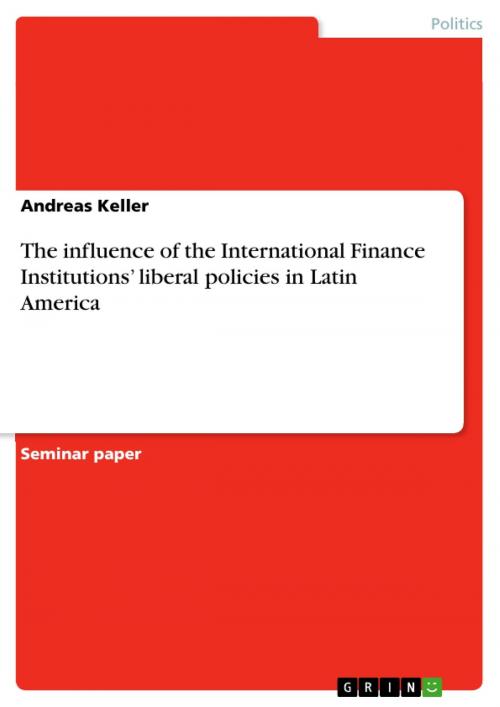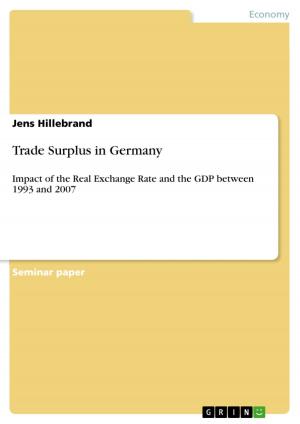The influence of the International Finance Institutions' liberal policies in Latin America
Nonfiction, Social & Cultural Studies, Political Science, International, International Relations| Author: | Andreas Keller | ISBN: | 9783640710560 |
| Publisher: | GRIN Publishing | Publication: | September 24, 2010 |
| Imprint: | GRIN Publishing | Language: | English |
| Author: | Andreas Keller |
| ISBN: | 9783640710560 |
| Publisher: | GRIN Publishing |
| Publication: | September 24, 2010 |
| Imprint: | GRIN Publishing |
| Language: | English |
Seminar paper from the year 2008 in the subject Politics - International Politics - Topic: International Organisations, grade: 1,0, LMU Munich (Geschwister-Scholl-Institut für politische Wissenschaften), language: English, abstract: Regularly, the International Finance Institutions (the World Bank and the International Monetary Fund)are critized harshly by Latin American leaders - Venezuela's Hugo Chávez even called them a 'curse' for Latin America, and condemned its 'shock politics that have spread hunger, misery, poverty and violence to our peoples.' The 'Banco del Sur', a new development bank recently founded by Venezuela and six other Latin American countries, is seen as an answer to the IMF and the World Bank. Criticism like this is common in Latin America. Some points are quite understandable: In the International Monetary Fund, which is responsible for monitoring the global financial system, the United States de facto has a veto power. Other Western industrial nations make up for the majority of the vote. The same applies to the World Bank whose president always is appointed by the President of the United States. It is hard not to suspect US political interests behind this appointment: Two World Bank presidents - Robert McNamara and Paul Wolfowitz - came from the US Department of Defense, where they were responsible for leading controversial wars like Vietnam or Iraq. These criticisms are well-known. This paper thus concentrates on the actual work of the International Finance Institutions in Latin America, the implementation of their policies and how they affected the subcontinent. Their influence is enormous: some hold the IMF and the World Bank responsible for severe crises that nearly lead to collapses of nations and for the ongoing underdevelopment of Latin America. Indirectly they are also blamed for the current enormous resurgence of leftist movements, which all declared the International Finance Institutions one of their main enemies. As the measures of the IMF and the World Bank are intertwined, they will be depicted together. First, the conceptual framework of the IMF, the World Bank and the 'Washington Consensus' will be presented, followed by a short summary of Latin American economic history from the 1950s to the 1990s. Then the different measures of the structural adjustment package of the Bretton Wodds Institutions, their impact (illustrated by different country examples) and outcomes will be discussed in detail. Finally this paper will give attention to the 'Banco del Sur', a development bank very recently founded by seven Latin American nations that should make these countries independent from perceived Western influence through the IMF and the World Bank.
Seminar paper from the year 2008 in the subject Politics - International Politics - Topic: International Organisations, grade: 1,0, LMU Munich (Geschwister-Scholl-Institut für politische Wissenschaften), language: English, abstract: Regularly, the International Finance Institutions (the World Bank and the International Monetary Fund)are critized harshly by Latin American leaders - Venezuela's Hugo Chávez even called them a 'curse' for Latin America, and condemned its 'shock politics that have spread hunger, misery, poverty and violence to our peoples.' The 'Banco del Sur', a new development bank recently founded by Venezuela and six other Latin American countries, is seen as an answer to the IMF and the World Bank. Criticism like this is common in Latin America. Some points are quite understandable: In the International Monetary Fund, which is responsible for monitoring the global financial system, the United States de facto has a veto power. Other Western industrial nations make up for the majority of the vote. The same applies to the World Bank whose president always is appointed by the President of the United States. It is hard not to suspect US political interests behind this appointment: Two World Bank presidents - Robert McNamara and Paul Wolfowitz - came from the US Department of Defense, where they were responsible for leading controversial wars like Vietnam or Iraq. These criticisms are well-known. This paper thus concentrates on the actual work of the International Finance Institutions in Latin America, the implementation of their policies and how they affected the subcontinent. Their influence is enormous: some hold the IMF and the World Bank responsible for severe crises that nearly lead to collapses of nations and for the ongoing underdevelopment of Latin America. Indirectly they are also blamed for the current enormous resurgence of leftist movements, which all declared the International Finance Institutions one of their main enemies. As the measures of the IMF and the World Bank are intertwined, they will be depicted together. First, the conceptual framework of the IMF, the World Bank and the 'Washington Consensus' will be presented, followed by a short summary of Latin American economic history from the 1950s to the 1990s. Then the different measures of the structural adjustment package of the Bretton Wodds Institutions, their impact (illustrated by different country examples) and outcomes will be discussed in detail. Finally this paper will give attention to the 'Banco del Sur', a development bank very recently founded by seven Latin American nations that should make these countries independent from perceived Western influence through the IMF and the World Bank.









![Cover of the book The basics of teamwork [Hausarbeit plus Präsentation] by Andreas Keller](https://www.kuoky.com/images/2003/april/300x300/9783638181020-HqTK_300x.jpg)





